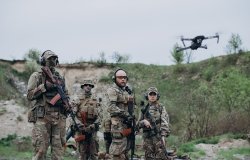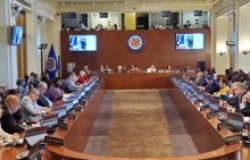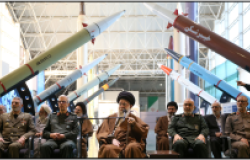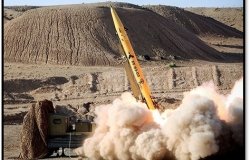What Stood Out From Obama’s Speech on Iran Deal at American University
At American University, the president was not the persuader in chief but the lecturing professor in chief—and his approach was unlikely to gain converts. Here's why.
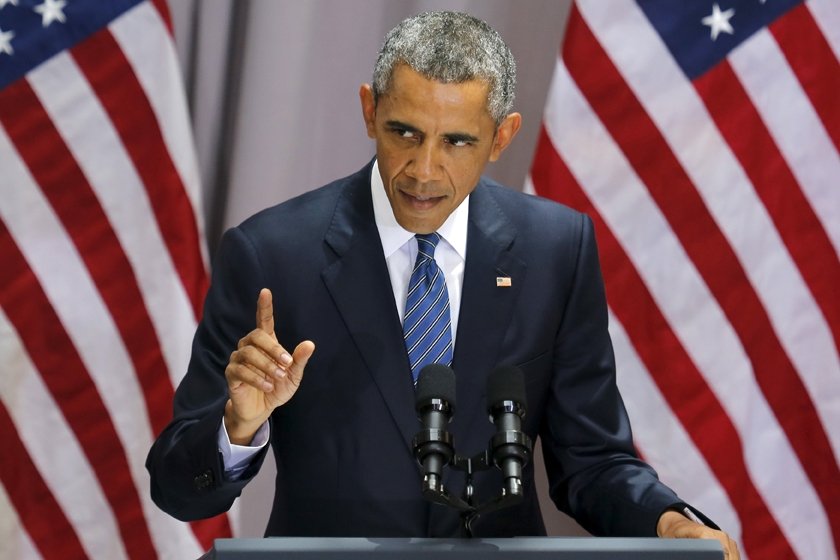
President Obama is likely to get his Iran deal through Congress, but that’s because of his advantages in congressional math, not thanks to his powers of persuasion. Wednesday’s address was no uplifting moment like that at American University in 1963 when President John F. Kennedy delivered his “we all breathe the same air” speech in an effort to market the advantages of agreements with the Russians.
Tone: President Obama often does not extend to his critics the assumption of good faith, and it showed in his rhetorical approach. He spoke over and past skeptics; it was a speech for supporters ready to believe that this is more than just a good deal. Triumphalism will reach very few of the people the president most needs to persuade. Many lawmakers who end up voting for this deal are going to be, as C.S. Lewis might have said, dejected converts. That means meeting them, tonally, where they are: in the ambivalent, grounded middle. Mr. Obama spoke as if there is no room for doubt: “I’ve had to make a lot of tough calls as president, but whether or not this deal is good for American security is not one of those calls, it’s not even close.”
Overselling: It’s legitimate to argue that this agreement may be the best that could have been achieved under current circumstances. Some say that had the United States been tougher, threatened to use force or challenged Iran’s policies in the region, the administration might have gotten a better deal. The president disagrees–and fair enough. But to leap from calling this a defensible deal to one that “permanently prohibits Iran from obtaining a nuclear weapon” strains the bounds of credulity. If there were no sunset provisions on the key restrictions against testing advanced centrifuges, maybe. But those limits begin to disappear in years eight and 10 of the accord. Iran will be left with a large enough nuclear infrastructure to weaponize should it choose to do so. Yet Mr. Obama asserted that “this is the strongest non-proliferation ever negotiated.” That is akin to Secretary of State John Kerry’s statement that this is a “forever” agreement. Their confidence and self-assurance are breathtaking given the uncertainties in this situation.
The Iraq war analogy: The Iraq war turned out to be a disaster. It was one of the two longest conflicts in U.S. history, and victory was defined not in terms of whether we could “win” in a conventional sense but “when could we leave?” and what we were able to leave behind. Mr. Obama’s suggestion that opposition to the Iran deal is rooted in the same mind-set that got the U.S. into Iraq–the “preference for military action over diplomacy”–may apply to some members of Congress, but it’s wrong to suggest that that is the dominant trope. Such a suggestion means that opposing this agreement can only be irresponsible warmongering. That unfairly turns legitimate doubts about this accord into arguments unworthy of serious consideration.
War or agreement: “The choice we face is ultimately between diplomacy or some form of war–maybe not tomorrow, maybe not three months from now, but soon.” Rarely is life a matter of binary choices as Mr. Obama sketched out so dramatically. (Here’s the argument one of us laid out recently that a slide into war is not inevitable should the deal fall through.) And let’s be clear that there are many other non-nuclear contingencies involving Iran that could devolve into regional conflict, particularly another Israeli-Hezbollah confrontation across the Lebanese border or conflict in the Gulf between Iranian Revolutionary Guard naval units and U.S. military forces. Could Israel or the U.S. end up in a fight with Iran? Sure. Is it foreordained? No. And arguing that it is makes Congress the sole repository and home of the reckless and uninformed for opposing the agreement.
At American University, the president was not the persuader in chief but the lecturing professor in chief—and his approach was unlikely to gain converts.
The opinions expressed here are solely those of the authors.
This article was originally published on The Wall Street Journal's Washington Wire.

Middle East Program
The Wilson Center’s Middle East Program serves as a crucial resource for the policymaking community and beyond, providing analyses and research that helps inform US foreign policymaking, stimulates public debate, and expands knowledge about issues in the wider Middle East and North Africa (MENA) region. Read more


